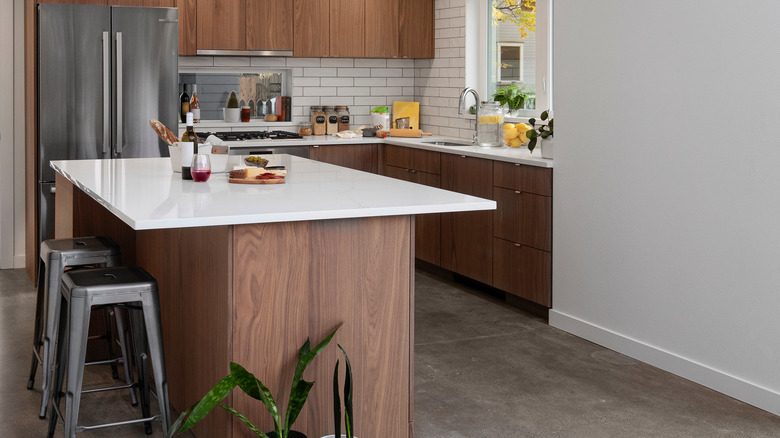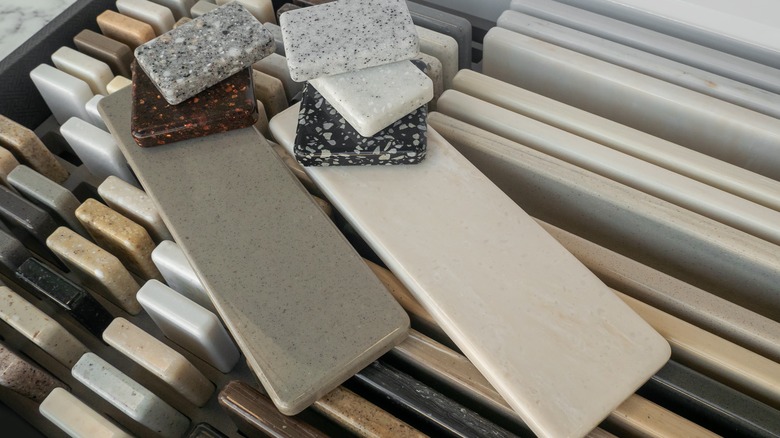The Downsides Of White Concrete Countertops (And What To Choose Instead)
White cement counters are modern, elegant, and unique. While the alluring images flooding your social media feed might convince you to install them in your home, there are certain things you should know before you buy concrete countertops. For starters, your countertop won't be entirely white. Be prepared for the concrete to showcase aggregate-speckled "pepper" spots along the counter. Thin cracks will also develop after some time due to the material shrinking, marring the ivory surface. Although you can repair it without replacing the entire surface, it requires time and effort.
You'll also have to wipe up spills immediately, especially acidic and staining ones, like lemon or tomato juice and red wine. Clean concrete countertops with mild dish soap to keep permanent stains at bay. Moreover, white concrete countertops require regular sealing and maintenance to withstand the regular wear and tear with elan. Since the material is absorbent, it'll happily lap up the spills and develop stains unless a water-based wax sealant acts as a barrier. So, you'll have to seal the countertop monthly to keep it in tip-top shape and combat scratches left over by sharp objects like knives. If that's not possible, sealing it every year is paramount.
Concrete countertops are costly and heavy
Concrete countertops aren't cost-effective and might burn a hole in your pocket if you're on a tight budget since they're custom-made to fit each homeowner's requirements. To put this into perspective, expect to pay between $50 and $150 per square foot for the material (per Angi). That said, the actual cost to put in concrete countertops will depend on the design, personalized edge, inlay, drainboard details, bespoke colors, and thickness you opt for. Also, these counters aren't DIY-friendly if you don't have the requisite experience, meaning you'll have to contract professionals. Due to the desired skill level, you might have to shell out $40 to $50 per hour for one person for the installation alone, but costs will vary from contractor to contractor.
Since concrete countertops are incredibly heavy, weighing between 19 and 25 pounds per square foot, you'll have to install additional support underneath the surface to ensure the cabinet and floor don't buckle under the pressure. Another thing to consider is that you'll have to give your cement countertop at least 28 days to get ready for use. One more thing to remember is if you get them poured directly instead of installing solid slabs, the counters will be a permanent fixture in your home, and it'll be extremely challenging to get the white concrete countertop out.
Alternatives to white concrete countertops
If your heart is set on a cement countertop's rugged charm, but the downsides seem insurmountable, choose an alternative. For instance, natural stone countertops made from marble and granite can easily mimic a white concrete countertop's industrial look and feel. But that's not the only reason they're a worthy choice over cement counters. You also won't have to deal with the slew of imperfections or cater to concrete's maintenance needs.
However, if your primary concern is the eye-watering costs associated with concrete countertops, opt for manufactured countertop materials like quartz. You can retain the look of concrete without emptying your bank account. To illustrate, quartz countertops cost between $50 and $100 per square foot (via Angi). Plus, you'll have to bear $10 to $30 per square foot for installation. Quartz isn't high-maintenance and doesn't weigh as much as concrete, so you won't have to spend money to reinforce the cabinets and floor.
Alternatively, you can go with soapstone countertops. These counters are easy to clean and remove scratches, but they'll develop a patina-like concrete. If you're not a big fan of the patina, oiling the slabs bi-annually (or annually) will do the trick. Butcher blocks are also a good option, as they're easy to clean and refinish and are durable. Though their installation cost is high, it's still relatively less than concrete.

